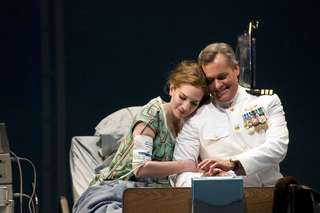|
Back
Seattle’s world premiere takes off with grace Seattle
McCaw Hall
05/08/2010 - & May 9, 12, 15, 16, 19, 22, 2010
Daron Aric Hagen: Amelia
Kate Lindsey (Amelia), William Burden (Dodge), Luretta Bybee (Amanda), Nathan Gunn (Paul), Jennifer Zetlan (The Flier), Nicholas Coppolo (Icaraus/Young Boy), Jordan Bisch (Daedalus/Young Boy’s Father), Jane Eaglen (Helen), Ashley Emerson (Young Amelia), Karen Vuong (Trang/Nurse), David Won (Huy/Doctor), Museop Kim (Interpreter/Second Doctor)
Gerard Schwarz (Conductor)
Stephen Wadsworth (Stage Director), Thomas Lynch (Set Designer), Ann Hould-Ward (Costume Designer), Duane Schuler (Lighting Designer)

K. Lindsey (Amelia), W. Burden (Dodge) (© Rozarii Lynch)
Seattle Opera lacked a crucial element since lauded general director Speight Jenkins has run the show for 27 years. Until now, he has never commissioned an opera.
With Amelia, which made its elaborate two-hour world premiere this month, operagoers should have even firmer confidence in Jenkins’ vision. Beginning in 2002, when he sorted through contemporary composers’ works with director Stephen Wadsworth, settling on Daron Aric Hagen’s music, he never looked back from his original intention to make an American opera with American themes.
He did much more that in spearheading the creation of this distinctly modern yet delightfully tuneful opera. Favorable reviews and healthy audience attendance are proving that Jenkins and his Seattle company are well worth their worldwide reputation for more than Wagnerian operas.
The story of Amelia, based on Gardner McFall’s poetic libretto (and childhood), is about a girl who loses her much-loved pilot father when he’s shot down during the Vietnam War in the mid-1960s. At least that is the beginning. The storyline is anything but linear or literal. It jumps around in time and pursues several storylines and time periods simultaneously.
We see young Amelia (sung by the petite soprano Ashley Emerson) grow into a questioning young woman (captivating mezzo Kate Lindsey) who has never resolved the loss of her father. She goes to Vietnam in 1985 to find out more details about his death, which slakes some of her curiosity, but 10 years later, when pregnant, she becomes overwrought with fear about bringing her own child into the world whom she might lose as she did her dad. As McFall’s libretto repeats many times over, “the risk is worth the love.” To complicate things, her husband Paul (baritone Nathan Gunn) designs top-secret fighter planes, which tips Amelia into an in-office hysterical fit (a rare scene for a mezzo though Nelson takes it to its extreme in operatic tradition). Her dramatic fit leads to a coma, which she does come out of in the second act in a full-on accurately designed hospital room.
Of course, in Seattle, with a name like Amelia and a company like Boeing, the opera was a natural for the themes of flight. The Flier, sung by soprano Jennifer Zetlan, an obvious stand-in for the wildly idealistic, high-achieving red-blooded American aviatrix Amelia Earhart earns a mythical, above-stage presence (until the end when she encourages the down-on-earth post-coma Amelia to have her baby naturally, as Amelia insists). Set designer Thomas Lynch even built a full replica of her Lockheed Electra, Earhart’s plane on her final 1937 flight when she went missing in the Pacific. The replica plane rolled on stage with a wingspan of 55 feet, yet another operatic feat. The extraordinary sets required17 builders, 10 scenic artists, 20,000 hours, 2 1/2 miles of steel and aluminum, and quite literally, a first-scene kitchen sink. The sets are so complicated that conductor Gerard Schwarz plays almost 5 minutes of music during the scene changes, which makes the opera seem much longer than its two hours.
A parallel story of the mythical Icarus and Daedalus about the son who flew too high, singed his wings on the sun, and crashed to his death, is intertwined with Amelia’s tale. In the second act, Icarus becomes a late 20th-century boy in the hospital, his father by his side, in a room next to Amelia’s. He dies as Amelia survives and the baby is triumphantly born au naturel.
The most amazing thing about this new opera is not its sweeping movielike music, lyrical words, imaginative sets, illuminating lighting, fabulous singing (tenor William Burden, soprano Jane Eaglen and Lindsey were all notable) and good acting (there were many secondary roles that required singers to play two roles during the opera), but the collaboration that made these elements work together. Jenkins chose the singers before Hagen wrote the score so the music fits the voices. Wadsworth took McFall’s poetic words and shaped them into scenes, which whether or not in sequence, made sense on a number of levels, including those tricky metaphorical ones.
And then there’s the nonette, sung a cappella at the end of the final act, which will blow devotees of daring unaccompanied ensemble-singing into ecstasy.
The opera has legs, tunes, and the ability to fly. Expect to see it performed many years hence after the giddiness of its first days fade.
Angela Allen
|